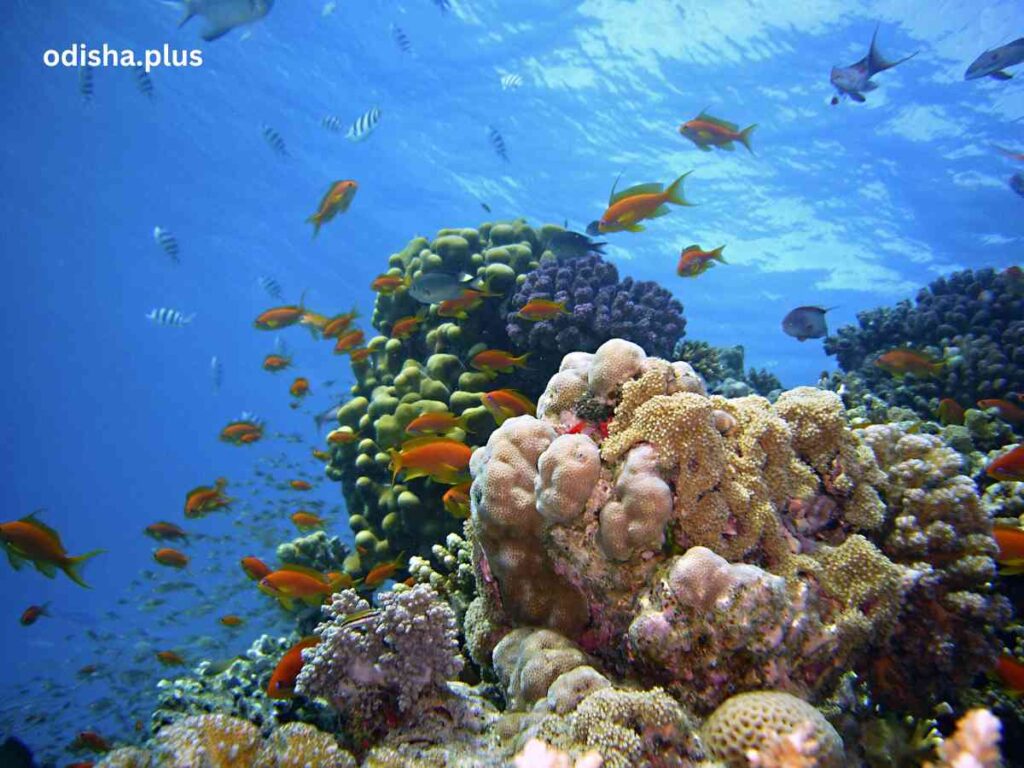India, with its vast coastline of over 7,500 kilometers, is well-positioned to harness the potential of the Blue Economy
Nilambar Rath

The Blue Economy is an emerging concept that encompasses the sustainable use of ocean resources to drive economic growth, improve livelihoods, and protect the marine environment. Also known as the ocean economy, it offers a new paradigm for coastal development, one that balances economic, social, and environmental considerations.
The Blue Economy is a comprehensive framework that encompasses various sectors, including fisheries, tourism, shipping, renewable energy, and coastal protection. It recognizes the interconnectedness of these sectors and promotes sustainable practices to ensure the long-term health of marine ecosystems.
The Blue Economy is not just about exploiting ocean resources but also about preserving them for future generations.
India’s coastal regions are home to a diverse range of ecosystems, including coral reefs, mangroves, and estuaries. These ecosystems support a rich array of marine life and provide livelihoods for millions of people.
To unlock the vast potential of India’s Blue Economy and chart a sustainable course for its development, it is crucial to convene key stakeholders and facilitate a collaborative exchange of ideas. In this regard, the international conference, scheduled on January 23-24, 2025, at KIIT University in Bhubaneswar, assumes great significance. Organized by the Bhubaneswar City Knowledge Innovation Cluster Foundation (BCKIC) in association with DBT ILS Bhubaneswar, this conference promises to galvanize action and steer India’s Blue Economy towards a brighter, more sustainable future.
The Blue Economy offers immense potential for India, with opportunities for growth in various sectors:
- Fisheries and Aquaculture: India is one of the world’s largest producers of fish and seafood. Sustainable fishing practices and aquaculture can enhance the sector’s contribution to the economy while ensuring the long-term health of fish populations.
- Coastal Tourism: India’s coastline offers a unique blend of natural beauty, cultural heritage, and spiritual significance. Sustainable tourism practices can help preserve coastal ecosystems while generating income and employment for local communities.
- Renewable Energy: India has set ambitious targets for renewable energy, and the ocean offers vast potential for offshore wind, tidal, and wave energy. Harnessing these resources can reduce India’s dependence on fossil fuels and mitigate climate change.
- Shipping and Port Development: India’s ports are critical gateways for international trade. Investing in sustainable port development and shipping practices can enhance efficiency, reduce emissions, and promote economic growth.
To harness the diverse opportunities offered by the Blue Economy, India needs to adopt a multi-faceted approach that involves government, industry, and civil society. Some key strategies may include:
- Integrated Coastal Zone Management: Implementing integrated coastal zone management plans can help balance economic, social, and environmental considerations and ensure sustainable development.
- Investing in Research and Development: Investing in research and development can help India stay at the forefront of Blue Economy technologies and innovations, from offshore renewable energy to sustainable aquaculture practices.
- Promoting Sustainable Business Practices: Encouraging businesses to adopt sustainable practices can help reduce the environmental impact of coastal development and ensure the long-term health of marine ecosystems.
- Building Capacity and Skills: Building capacity and skills in coastal communities can help ensure that they benefit from Blue Economy opportunities and are equipped to manage marine resources sustainably.
Odisha, with its 480-kilometer coastline, is strategically positioned to tap into the vast potential of the Blue Economy. The state’s coastline is dotted with a diverse range of ecosystems, including mangroves, coral reefs, and estuaries, which support a rich array of marine life. Odisha’s vast coastline, combined with its rich biodiversity, wide agroclimatic zones, and vivid scope for biotechnology research, startup, and industries, makes it an ideal location for Blue Economy initiatives.
Odisha’s Blue Economy potential is further enhanced by its rich cultural heritage and spiritual significance, which can be leveraged to promote sustainable tourism practices. The state’s ports, including the Paradip Port, can be developed into sustainable hubs for international trade, enhancing efficiency, reducing emissions, and promoting economic growth. Furthermore, Odisha’s research institutions and universities can play a critical role in developing innovative Blue Economy technologies and solutions, driving growth, and creating employment opportunities in the sector.
The marine economy, or blue economy, includes marine biomanufacturing, which involves the production of pharmaceuticals, cosmetics, and other products from marine resources. However, the blue economy is facing significant challenges, particularly from climate change, which is causing sea-level rise, ocean acidification, and increased frequency of extreme weather events. Marine pollution, mainly due to plastic waste and oil spills, is another major concern that affects marine biodiversity and ecosystems.
To mitigate these challenges, it is essential to adopt sustainable practices and technologies. Marine biodiversity conservation efforts, such as establishing marine protected areas and promoting eco-tourism, can help preserve the health of marine ecosystems. Coastal disaster management strategies, including early warning systems and coastal protection infrastructure, can reduce the impact of natural disasters.
Additionally, deep sea mining and offshore energy development must be done responsibly, taking into account environmental and social concerns. The growth of marine industries and trade services, such as shipping and port management, also requires sustainable practices to minimize their ecological footprint. By adopting a sustainable and integrated approach to the blue economy, we can ensure the long-term health of our oceans and the economic benefits they provide.
The blue economy sector in India can be significantly harnessed through the application of technology and innovations, coupled with the growth of new-age startups. Technologies like artificial intelligence, IoT, and data analytics can optimize fisheries management, monitor ocean health, and enhance coastal resilience. Startups can develop innovative solutions for sustainable aquaculture, eco-tourism, and marine biotechnology.
Furthermore, advancements in renewable energy, such as offshore wind and tidal power, can reduce India’s carbon footprint. The government’s supportive policies and initiatives can foster a conducive ecosystem for startups to flourish, driving the growth of India’s blue economy and creating new opportunities for sustainable development.
The Department of Biotechnology, Government of India, has launched the Bio-E3 Policy, a strategic initiative aimed at promoting entrepreneurship, employment, and economic growth in the biotechnology sector, including the blue economy. This policy has the potential to accelerate the growth of India’s blue economy sector in several ways.
Firstly, the Bio-E3 Policy encourages entrepreneurship and innovation in the biotechnology sector, which can lead to the development of new and sustainable technologies for the blue economy. This can include innovative solutions for marine conservation, sustainable fishing practices, and coastal management.
Secondly, the policy focuses on employment generation, which can lead to the creation of new job opportunities in the blue economy sector. This can include jobs in marine biotechnology, aquaculture, and coastal tourism.
The Bio-E3 Policy also aims to promote economic growth, which can lead to increased investments in the blue economy sector. This can include investments in marine infrastructure, research and development, and sustainable technologies. Thus, the Bio-E3 Policy offers great potential to accelerate the growth of India’s blue economy sector by promoting entrepreneurship, employment, and economic growth.
(The author is a senior journalist and development communication specialist. Views expressed are personal.)
#BlueEconomy #MarineResources #BioTechnology #MarineEcosystem #ClimateChange #DisasterManagement #MarinePollution #RenewableEnergy #SustainableGrowth #MarineBiodiversity


























